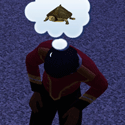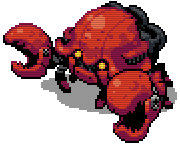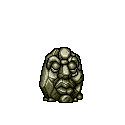|
Halloween Jack posted:This is something that I've tried to incorporate into magic in pretty much every game I've ever run, even in high fantasy. Ex nihilo nihil, which means that crazy, radical, and evil sorcerers get more raw power to work with. The way I've done it in the past, and how I assert that magic works in my TFV game, is that different sorts of magic work best based on different emotions, mentalities when working with magic, or simply different ways of viewing reality. Many types of magic with very malign reputations, like necromancy, blood magic, and shadow magic, have those reputations because the kind of mindsets that makes you very good at working with those forms of magic are often found in combination with extreme views or mental illness, or simply that people intending to do evil things with magic are interested in them for the potential. The magic itself is not evil - shadow magic, for example, relies on the mage being very familiar and comfortable with their own pain, fear, and doubt, and be comfortable triggering those dark parts of the mind in others. Many shadow mages are twisted, severely depressed, or sadists, and enjoy making others feel the same way, but noble shadow mages do exist and are some of the most compassionate and empathetic healers and counselors in the world.
|
|
|
|

|
| # ? Apr 19, 2024 18:26 |
|
Halloween Jack posted:This is something that I've tried to incorporate into magic in pretty much every game I've ever run, even in high fantasy. Ex nihilo nihil, which means that crazy, radical, and evil sorcerers get more raw power to work with. If I recall correctly, The Kerberos Club does something like this with regards to how it presents sorcery.
|
|
|
|
oriongates posted:Not that "subtle" means weaker by any means. Personally I find Cliomancers probably the scariest of all the adept schools. The poo poo a well-charged cliomancer can do is downright insidious. Cliomancers are a bit odd because they're kind of US-centric. In a smaller country, history will be much more concentrated and they'll presumably become more powerful. Heck, in the UK you can commute to London and pass through a number of historical sites on the way, possibly including the railway line you are on.
|
|
|
|
Bear in mind that only the first Cliomancer to a site gets the charge. This leads to a number of turf wars, many of which probably end with a body turning up somewhere.
|
|
|
|
Huh. Cliomancers sound almost exactly like how my group ended up running Feng Shui Sites and the flow of Chi in Feng Shui.
|
|
|
|
Pope Guilty posted:Bear in mind that only the first Cliomancer to a site gets the charge. This leads to a number of turf wars, many of which probably end with a body turning up somewhere. Yup, it was fine when we played a game in London - it just meant that the turf lines were drawn a lot more tightly and the cliomancer pecking order was a lot more established than I guess might be normal.
|
|
|
|
So could a Cliomancer get some non-famous property and then get charges by making it famous (through, I don't know, gruesome murders or something), or does that violate the law of transaction?
|
|
|
|
That would totally work but is a very long term project or exceptionally visible and dangerous and in both cases requires a lot of influence. I am at my airport to go back home and got a ton of cool stuff that I may talk about once Hunter is over.
|
|
|
oriongates posted:Now, there's one big limit on Tilts: every element you use can only be used once and never again. Speak your name aloud to represent yourself in the ritual? Well, that won't work again for any Tilt ritual you ever perform. Similar elements can work (for instance using a nick name, writing your name instead of speaking it, using your first name and last name separately, etc) but you can never re-use the exact elements for any Tilt ritual.
|
|
|
|
|
oriongates posted:Dipsomancers on the other hand would be hard pressed not to live as homeless drunks wandering from bar to bar and entropomancers are basically ticking clocks. These are adepts that are, at their best, one step above "magic hobos". Well, not necessarily. You totally can make a Dipso that can hold down a job or a Entropo that'll live to see thirty. You just have to stick to minor magicks and you probably feel like a chickenshit for only sipping at the edges of true ultimate power instead of drinking straight from the firehose.
|
|
|
|
Mors Rattus posted:That would totally work but is a very long term project or exceptionally visible and dangerous and in both cases requires a lot of influence. Yeah, I'm pretty sure you only get charges from old historic events and places, not just famous ones. Although now I'm curious what the cutoff is; if you can find it in a history textbook, it's probably important enough, or if there's a plaque saying "Jethro McSheepshagger slept here July 1873", but what about events from last year/month/week's newspapers? Could you go to Glendale Stadium and harvest a charge from the exact location Richard Sherman's heart ripped in half? Or would this be a GM decision that the book takes no particular stance on?
|
|
|
hyphz posted:Cliomancers are a bit odd because they're kind of US-centric. In a smaller country, history will be much more concentrated and they'll presumably become more powerful. Heck, in the UK you can commute to London and pass through a number of historical sites on the way, possibly including the railway line you are on. Remember how I said that UA infected everything I read? When I was into James Joyce, I wanted to write up a game about Cliomancers using the anniversary of Bloomsday to turn Dublin into a Groundhog Day version of that one day that Ulysess is set on. I guess it'd be Bibliomancers vs Cliomancers. I should probably just post this stuff in the dedicated UA thread to avoid ranting here or filling up the thread with things like War Boy Entropomancers. Or those drug guys brewing up magickal paint huffing rituals. I gotta say that as much as I love it, schools like Epideromancers can really bug me depending on my mood. I know people who've self-harmed, and having that be a route to magikal power can be really disturbing. I guess most of the schools like Dipsomancy can trigger people that way. I feel like if any game needs a 'this is all fake. This is not real' warning it's Unknown Armies. I'm glad that the media or fundies never picked up on it, since 'the game where you cut yourself for power' would make D&D's Satanic Panic look like nothing.
|
|
|
|
|
It would be interesting, to me, if Cliomancers' sense for historical importance allows them to know if something is significant. "But why aren't we talking about ACORN?" "I walked past their office. Didn't feel a thing."
|
|
|
|
Halloween Jack posted:It would be interesting, to me, if Cliomancers' sense for historical importance allows them to know if something is significant. But Cliomancers are about pop-history. It's what is known, not what is true.
|
|
|
|
Double Plus Undead posted:So could a Cliomancer get some non-famous property and then get charges by making it famous (through, I don't know, gruesome murders or something), or does that violate the law of transaction? You could do it, but you couldn't do it magickally. So for instance using something like Urban Legend to make a place artificially famous by starting a rumor like "[Famous Person] did [Famous Thing] here." could potentially make a place 'historical' but it would ruin it for charging. Can't make magick from magick. You could do it the mundane way though. There's no strict guidelines on what makes something "historic" but I'd personally say it needs to remain notable and well known for at least a generation or two. So obviously very long term. But remember how I said Cliomancers were loving scary? Well, think about this. Probably the most famous and well known historical moments are assassinations of famous and powerful people. The theater where lincoln got shot, the spot where JFK died (maybe even including the book depository and the grassy knoll), MLK, etc. And when you think about it, an assassination is probably the easiest way to arrange for a place to become famous...find someone already famous and kill them. Disasters or tragedies are another surefire way to force a place to "stick" in the collective unconsciousness. Now, how many assassinations and disasters were actually arranged by cliomancers so they can create historic sites and get that Major charge for themselves (not to mention a new significant charging site).
|
|
|
|
It seems like it would be pretty easy for Cliomancers who managed to obtain political or military power. Of course, "All world leaders are Cliomancers, and they manipulate events to get themselves major charges," seems like a pretty UA thing.
|
|
|
|
darthbob88 posted:Yeah, I'm pretty sure you only get charges from old historic events and places, not just famous ones. Although now I'm curious what the cutoff is; if you can find it in a history textbook, it's probably important enough, or if there's a plaque saying "Jethro McSheepshagger slept here July 1873", but what about events from last year/month/week's newspapers? Could you go to Glendale Stadium and harvest a charge from the exact location Richard Sherman's heart ripped in half? Or would this be a GM decision that the book takes no particular stance on? Yeah, its basically got to be both well-known (or connected to something well known) and it's got to have a certain amount of historical inertia built up. It doesn't matter if a place will be historical, its got to have that history already. If I were to rule on it as a GM I'd say...3 generations. UA has a strong "rule of threes" theme and I'd say a good guideline for history are cultural touchstones shared between grandparents, parents and children. As far as what qualifies as the "minimum" amount of history for a sight, its really up to the GM. But generally minor charges shouldn't be too difficult to harvest, so when in doubt its probably worth at least a minor charge.
|
|
|
Ratoslov posted:Well, not necessarily. You totally can make a Dipso that can hold down a job or a Entropo that'll live to see thirty. You just have to stick to minor magicks and you probably feel like a chickenshit for only sipping at the edges of true ultimate power instead of drinking straight from the firehose. Eh Keith Richards is, what, 70? Play a Kennedy or a rock star or an Alfie Dipso and they'll do fine, for certain values of 'fine'. And strap a GoPro to an Entropomancer and they'll get a Red Bull sponsorship and tons of money. I'd mix English cliomancy with psychogeography. And if you want theories of Urbanomancy I took a whole course on The City; lots of talk of flaneurs and Situationalism.
|
|
|
|
|
wdarkk posted:It seems like it would be pretty easy for Cliomancers who managed to obtain political or military power. There is a school that gains charges from impersonating iconic people, and the book suggests that one specific celebrity is racking up charges by building up a public persona and channeling himself. e: "Many high-ranking policemen are initiates in a school of law-based anti-magick. They use the power gained from upholding the law to reinforce morality. They're fighting a war against a group of corrupt cops who use power from oppressing the innocent to further their own goals. Nearly half of police actions are somehow involved in this conflict." Kellsterik fucked around with this message at 01:42 on Jun 8, 2015 |
|
|
|
darthbob88 posted:Yeah, I'm pretty sure you only get charges from old historic events and places, not just famous ones. Although now I'm curious what the cutoff is; if you can find it in a history textbook, it's probably important enough, or if there's a plaque saying "Jethro McSheepshagger slept here July 1873", but what about events from last year/month/week's newspapers? Could you go to Glendale Stadium and harvest a charge from the exact location Richard Sherman's heart ripped in half? Or would this be a GM decision that the book takes no particular stance on? IIRC if nobody visits a place for its history, it's probably not building up Cliomantic charges. Double Plus Undead posted:So could a Cliomancer get some non-famous property and then get charges by making it famous (through, I don't know, gruesome murders or something), or does that violate the law of transaction? That sounds like a really good way to get a visit from angry Sleepers.
|
|
|
|
Kellsterik posted:There is a school that gains charges from impersonating iconic people, and the book suggests that one specific celebrity is racking up charges by building up a public persona and channeling himself. This explains so much about the King from New Vegas and his unnatural charisma and appeal.
|
|
|
|
Kellsterik posted:There is a school that gains charges from impersonating iconic people, and the book suggests that one specific celebrity is racking up charges by building up a public persona and channeling himself. What would the UA effects of Charlie Chaplin losing his own lookalike contest be?
|
|
|
|
Kavak posted:What would the UA effects of Charlie Chaplin losing his own lookalike contest be? Well, if the winner of the contest was a personamancer that'd probably be worth a Significant charge. Technically its not one of their charging rituals but as a GM I'd certainly allow it. Now, if the contest took place in the modern day and was widely broadcast, then it would be worth a Major charge (to get a Major charge the personamancer must convince an extremely large group that they are someone famous). It could also be seen as a conflict between Avatars. Charlie Chaplain losing the contest could be good or bad depending on Archetype, but its probably a sign that some other Avatar one-upped him.
|
|
|
|
Solid start to a Proxy ritual if you wanted to become Charlie Chaplin for magickal purposes.
|
|
|
Kellsterik posted:Solid start to a Proxy ritual if you wanted to become Charlie Chaplin for magickal purposes. Where does Robert Downey Jr., who first got respect playing Chaplin, came in? I'm sure his father's gang of underground filmmakers included an occultist or two.
|
|
|
|
|
Count Chocula posted:Where does Robert Downey Jr., who first got respect playing Chaplin, came in? I'm sure his father's gang of underground filmmakers included an occultist or two. Robert Downey Sr. (a prince), literally.
|
|
|
|
Night10194 posted:This explains so much about the King from New Vegas and his unnatural charisma and appeal. Elvis actually fills a different metaphysical role in UA.
|
|
|
|
Unknown Armies, part 8: Adepts, pt 2 Okay, you remember how I mentioned adepts are inherently insane? Well, they are. But that insanity is a spectrum. On one end you've got the hyper-intelligent and weirdly charismatic psychopaths like the bibliomancers and cliomancers. They can blend in fairly well (sometimes really well) with society and don't seem too off until you actually try to get to know them. Then on the other end of the spectrum you have the next three adepts. These guys are hosed. up. Theoretically they can operate within civilized society but keep in mind that being an adept is about being completely dedicated to a certain worldview, and these guys have a view of reality that is almost totally incompatible with any form of social life, friendship, loved ones or anything on the upper half of Maslow's hierarchy of needs. Adopting these adept schools puts you just a few missteps from being locked up, or dead. Of course, because of that they have become iconic to the Unknown Armies setting and, in my experience, they're probably the most popular adept schools. Oh, and it probably goes without saying but these guys pretty much spell out "Trigger Warning" in giant, flaming letters. quote:Some—many? all?—pets are telepathic, and keep notes on which humans treated them well and which didn’t. One day they will repay us all, for good and bad. Dipsomancer 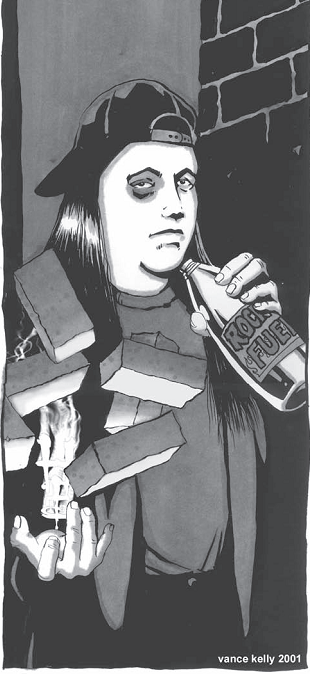 This guy's clearly got it aaaaalll figured out We're starting with the least self-destructive of the "big three", although not by much. The dipsomancer is more than just an alcoholic with spells. It's not that they like getting drunk, it's not even that they need to get drunk, it's that being drunk is the only way reality makes sense. To the dipsomancer the world of sobriety is not the real world. To be sober is to be trapped in a scary, nightmarish world and alcohol is the only thing that allows you to actually see the "real" world underneath. It's a gateway that allows you to actually live for a few hours until the buzz wears off and you're back in the nightmare again. And these guys are the least self-destructive of the three. The central paradox of dipsomancy is probably one of the most obvious: You're trading hours of happiness for decades of pain. You gain power by surrendering yourself to an addiction and you can only truly live by filling yourself up with poison. Dipsomancy demands living sacrifice and that sacrifice is you, it'll just be a while before you end up on the altar. To help explain dipsomancy, I'll skip ahead a little and explain how intoxication works in UA. For simplicity sake alcoholic intoxication is measured in generic "drinks". A drink is enough alcohol to make you feel the effects: one beer, one shot, a glass of wine, etc. You can slug back one drink with no consequences. After that, each drink gives you a -5% penalty to Mind, Body and Speed-based skills. Soul-based skills may or may not be impaired (you're probably worse at social skills, but things like magick or intuition are unaffected). The penalty decreases by 5% every hour you go without a drink. Once the penalty hits 50% or more you need to make an (unpenalized) Body roll every hour or you pass out. -60% means you're in a blackout. -100% means you've gotten alcohol poisoning: roll body again and if you fail you vomit, pass out and take damage equal to the sum of the dice. You then take an additional d10 damage per hour until you wake up unless you get your stomach pumped. Charging Rituals Dispsomancers have pretty much the easiest time of any adept gaining minor charges: you take a drink. So long as you drink enough enough to take a penalty you get one minor charge. That means if you're already sober you've got to "prime" yourself with one drink but after that every drink gets you a minor charge until you sober up again (you can chug large quantities of alcohol to gain multiple minor charges at once. Someone with a strong stomach and a bottle of everclear can go from "zero" to "blasted" (and blasting) in a very short time). Significant charges are tougher to get ahold of, but once you have the right tools they flow just as easily as minor charges. To get a significant charge you have to take a drink (again, enough to impair you) from a cup or container of historical or spiritual significance: Oda Nobunaga's sake-cups made from the skulls of his enemies, the hip flask of the Red Baron, the broken bottom of the wine bottle used to christen the Titanic, etc. So long as you have a suitable vessel then any drink from it gives you a significant charge. Its important to note that dipsomancers cannot share these vessels: if you give it away you can never gain power from it again. If its stolen or taken against your will you can keep using it so long as you can get it back. This seems like a real-game changer until you remember the obvious fragility of most drinking vessels and the raging drunks who might be carrying them around. Major charges are tougher of course. To snag a major charge you need to drink some form of one-of-a-kind alcohol: ancient preserved mead or Glenfiddich 1937. A vessel potent enough to give a significant charge can generally be counted on to give a Major charge if it still has the remnants of the original owner's drink (so if that hip flask still had some dregs left in it you could chug it for a Major charge). You do not have to drink enough for a penalty when it comes to major charges, although you have to be tipsy already (-5%). Taboo With charges coming so easily to a dipsomancer, its not hard to guess their taboo is going to be rough, and it is. Their taboo is sobriety. As soon as a dipsomancer sobers up they lose all charges. Spells Dipsomancy spells are all conceptually linked by the idea of cheating. Dipsomancers have short cuts to power and can get around problems in ways they aren't quite supposed to. This gives them a very unusual mix of abilities. I'm convinced that many dipsomancer formula spells are heavily pun-based. For example Dipsomancers are the best adepts at dealing with ghosts or demons...because they're great at handling "spirits". Get it!? *Whammy (Minor and Significant) The dipsomancer blast is basically magically throwing things at people (I'm not sure why either). Basically some loose object flies through the air poltergeist style and smacks someone. Size doesn't really matter: bigger objects fly slower but have more mass, smaller objects have less heft but have enough speed to hurt. This follows the normal rules for magickal Blasts, except that it works exceptionally well on someone who is also drunk: for every 10% of impairment someone is suffering you can add an extra d10 damage straight to the total. This means fights between dipsomancers are going to get very bloody in very short order. *Hold My Liquor (Minor) For a minor charge you can take your next action with no penalty from drinking. Keep in mind you still need an action to cast the spell. You can also cast it reflexively to ignore a failed Body roll to pass out. *Thimblebelly (minor) For a minor charge you can inflict your intoxication penalty on someone else for their next action (it won't make them pass out or get alcohol poisoning: just penalizes their roll). *Party Like Hell (Minor) You can summon a demon! Remember these guys aren't physical in UA...and dipsomancers have no power to actually control demons (although some Significant formula lets them hurt or trap spirits). *Just a Harmless Drunk (Significant) You are ignored by those around you for about 15 minutes. This isn't invisibility just a SEP Field. In combat this means anyone who tries to target you suffers -30% to hit you (-50% if you're just sitting still and doing nothing) and outside of combat they've got to make a Notice roll at -40% to even realize you're there (-60% if you're sitting still). *God Looks Out For Drunks (Significant) you can use Dipsomancy in place of any other skill for one action. Remember, this means you can flip-flop (as dipsomancy is your obsession) and ignore your intoxication penalty (since its Soul based). *Astral Stumble (Significant) You can leave your body and wander the astral plane as an invisible and incorporeal spirit. The downside: you stay that way until you wake up sober about 8 hours later. This is potentially quite dangerous as the dipsomancy blast has no power astrally and you can't gain charges in this state. *Dipsomancy Major Effects: Switch bodies with someone else, move a group of people anywhere else in the world, raise the dead (although they'll always come back wrong). quote:Some—many? all?—pets are telepathic, and keep notes on which humans treated them well and which didn’t. One day they will repay us all, for good and bad. Entropomancers 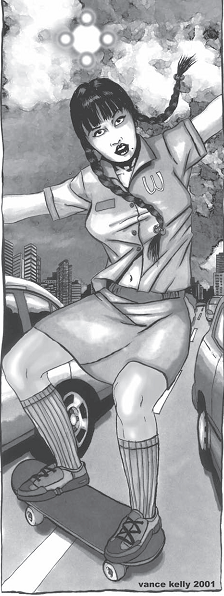 Chaos mages in the most literal sense of the word. Entropomancers live life like they're constantly auditioning for Jackass and they ride that wave of stupid risks and dangerous stunts into some of the most dramatic and powerful forms of magick. Sleepers loving hate these guys, not only is it tough for them to keep their magick under wraps when they're actually trying...but its tough to intimidate someone who sees playing in traffic as a form of transcendental meditation. Basically entropomancers get power from taking risks. Any risks. The bigger the better. The central paradox of entropomancy is a lot like dipsomancy, but more immediate: power is gained only through powerlessness and surrender. In order to gain power you must be willing to accept the possibility of losing everything without trying to stop it. It's not about calculated risks or gambling smart and going home: entropomancy is all about complete and total surrender to the whims of chaos before you can make everyone else surrender to your whims. Charging Rituals Minor charges are easy, but potentially unpleasant. You have to risk something of significant value (enough money to mean something to you, your pride or minor injuries). This could involve letting someone throw rocks at you while you're blindfolded, pissing on a biker's shoes or simply putting down your paycheck on a roll of the dice. Win or lose you get a charge. Remember the laws of Transaction and Obedience. You don't get to "game" these risks, you've got to surrender control and you have to give over to complete randomness or unknown fate. Insulting a biker is fine, insulting a biker while you've got a bunch of big muscular friends standing behind you is not. Significant charges are earned by risking your life or livelyhood and there can be no gain involved. You can gamble to earn minor charges and you might end up with loads of cash and plenty of mojo. But significant charges must be earned for their own sake. If you're willing to completely risk your life you can gain significant charges at a frightening rate...grab a revolver and a bullet and you can earn...up to...five significant charges in a matter of seconds. Major charges are fairly low-hanging for entropomancers, or at least ones with no sense of morals. To get a major charge you've got to take a life-threatening risk for both yourself and at least 10 others. Alternatively, yourself and just one other person...so long as that other person is someone you love (hope you like Self checks). It's good to note that there's nothing that says these participants can't be willing...an entropomancer-led cult probably won't last long but they'll definitely have fun before they blow themselves up. Its important to notice that risks taken by entropomancers must be done deliberately for the purpose of gaining charges. Fleeing into traffic being pursued by police is not worth a significant charge because it lacks the intent and ritual context. Likewise, driving a hijacked bus the wrong way down the highway won't get you a Major charge if you're only doing it to try and evade police pursuit...simply endangering people isn't enough, you've got to be doing it for the sake of your magick. And remember the law of transaction: you can't use your magick to help you survive or "win" charging rituals. Taboo Get someone else to take a risk on your behalf. You can't gamble with someone's life if you're not also at risk. You have to be at the front-lines of any conflict and you can't ask anyone to do something you aren't willing to do yourself. Violate the taboo and you lose all charges. Spells Entropomancer spells, unsurprisingly, deal in coincidence and luck. Basically it lets you stack the deck...you take the risks and the hits at times of your choosing and in exchange you can make sure everything else is smooth sailing. *Evil Eye (Minor or Significant) This is the entropomancer's Blast. It causes the victim's body to erupt in cuts and injuries, usually in the shape of words, letters or symbols. You can "gamble" on your blasts: roll a d10 and if its even you add the result to the blast's damage. If it's odd the blast does no damage. You can roll up to five extra dice and can even do them one at a time but the moment you get an odd one your blast fizzles. Victims killed by a blast literally explode. *Taste of Chaos (minor) The victim takes a -10% penalty to their next action per minor charge you spend. *Pierce the Veil (minor) You can summon a demon. This spell grants you no control, but a significant formula spell exists for that purpose. *Fortune's Fool (minor) You can reroll a failed roll you just made (unless it was a failed fortune's fool spell). You can do this only once per action. *Bulletproof Chutzpah (minor) Any physical (not magickal) attack has a flat 50% chance of failing as long as the spell lasts. It lasts a number of rounds equal to the ones place on your spell roll (so 6 rounds for a roll of 26). *Long Distance Call (significant) Think of someone, pick up a phone and dial the first 10 numbers that come into your head. This will be the phone number for the phone physically closest to the person you're thinking of. *Luck of the Damned (significant) This spell reduces all damage from an attack to zero so long as you can come up with a coincidence to explain why. *Edit The World (significant) You can alter events from until the last sunrise or sunset. This can't effect massive change (undoing death, winning the lottery) but it can reduce damage, retroactively deciding to do something that only comes up now (for instance, stating that you happened to stick a can of gasoline in your trunk this morning). *On a Roll (significant) You get +10% to all rolls for 24 hours. *Entropomancy Major Effects: You can change history, although anything before you were born probably requires escalating numbers of major charges. Just remember, you decide what changes, the GM gets to decide what that means for the present. Paradox isn't an issue though...but that also means you can change history to prevent your own birth. quote:If you sync the London recording of Jesus Christ Superstar—y’know, the one with Murray Head as Judas?—with the DVD of Casablanca, just wait til the song “Poor Jerusalem” comes on—everything will become clear when you hear the song explaining the visuals in the movie. Tzim...I mean, Epideromancers  A breed of adept that is simultaneously pitiful and very, very scary. They're probably one of the most flat-out dangerous adepts to mess around with due to their unique abilities of "self-improvement". Epideromancers gain their powers through self-inflicted injury. They aren't suicidal, in fact they're probably more protective of their lives than entropomancers or dipsomancers, but they see self-harm as the ultimate form of self-control. Many will probably recognize it as disturbingly close to the reasoning behind real-life self-harm. For Epideromancers it's deeper though. The ability to inflict harm upon yourself shows that you've overcome your own limitations in a profound way: you aren't afraid of the pain you cause yourself, you aren't bound by primitive instincts of self-preservation. Your body is a temple and you are god. Much like entropomancy and dipsomancy the paradox of epideromancy is power through weakness: self-control through self-destruction. You create perfection by destroying yourself. Your need to harm yourself shows just how little control you actually have. Charging Rituals Minor charges are built through minor injuries, at least 3 points. The injury must be self-inflicted, no charging up from others hurting you. Generally epideromancers have enough self-control that they can whack off precisely 3 points of damage at a time to build charges. Remember, injuries are tracked separately so multiple minor charges are a bitch to heal from...and no healing charging damage with magick. Significant charges simply take greater amounts of injury, simply inflict 2d10 damage on yourself (+3 if you get a match on the roll). This is actually often much more efficient than building minor charges. One significant charge can be "broken down" into 10 minor charges, which would require 30 damage compared to a maximum of 23 from a significant charge. Of course, significant charging is more likely to force you to deal with major wounds and it's harder to heal from unless you're a good doctor. But it is fast. Epideromancers have the easiest major charges: they just have to permanently maim themselves. Cut off a hand or foot...bam! Major charge. Your eyes are worth two! and you could get another couple for both ears and your nose. How about drinking acid or digging out a kidney? (in game terms this means you take 1d100 permanent, unhealable damage). Obviously an epideromancer with nothing to lose is one dangerous bastard. Taboo The epideromancer taboo is both really easy and really hard to hold to. You can't willingly allow anyone else to modify your body. Being shot or cut by an enemy won't break your taboo but getting a piercing or a haircut will. This is fairly easy to stick to so a patient epideromancer can build up large quantities of Minor and Significant charges by hurting themselves and then patching themselves up with first aid and allowing their injuries to heal. Combined with the fact that many of their spells allow them to make permanent or long-lasting changes it means experienced epideromancers are often walking nightmares. Of course, this also means you can't go to the hospital without losing all your charges...hopefully you don't get too badly hurt. Spells Obviously epideromancers deal in flesh and the warping and shaping thereof. Their power is limited purely to altering the physical bodies of living or once-living beings. *Warping (Minor and Significant) Warping is the epideromancer Blast. Unlike other Blast spells its not ranged (and can't be used for long-range blasts). You have to touch your target and then you can just reach into their body and yank bits off. This can be combined with the damage from hand-to-hand attacks (epideromancer martial artists are really deadly). You can also direct the damage somewhere else in their body...touch someone on the arm and make blood gush from their eyes and mouth. *Regeneration (minor) Heal 1d10 damage for yourself or someone else. This can't heal damage you take from charging. *Relentless Will (minor) You don't need to sleep for about 20 hours. *The Mirror Lies (minor) You can reshape your appearance. This only cosmetic and isn't precise enough to exactly copy specific individuals. *Greater Warping (minor) This doesn't inflict damage but it lets you reshape someone's body in messed up ways: seal their lips or eyelids together, make their fingers bend backwards. You can affect an area roughly the size of your palm. This includes simply closing up someone's mouth and nose and suffocating them. *Body Like a Still Pond (significant) Your body ripples and flows around attacks. All attacks (hand to hand or firearm) deal only the damage in the tens place of the roll, no physical attack can inflict more than 10 damage to you at once. It lasts a total of 3 rounds. *Face Shift (significant) This is a more dramatic appearance altering spell. If you've got a skill related to appearance you can increase or decrease it by 5% per casting, permanently (or until you alter yourself again), up to your Soul stat (even if it isn't a Soul skill). *Body Like Iron (significant) You get three extra wound points, permanently. This can increase your wound points up to 250! *Preternatural prowess (significant) Permanently increase your Body or Speed by 5 points (increasing your body this way does not increase wound points). Maximum is 85%. *Master of Flesh (significant) For five significant charges you can increase your Body, Speed or Wound Points by the sum of your skill roll (so if you succeeded with a 19, you gain 10 points). This can increase your stats above 85% (above 100% in fact) but you still can't have more than 250 wound points. *Epideromancy Major Effects: Completely redesign your own body or someone else's. Become young or old. Gain the ability to alter your sex between male and female at will. transform into a different living creature. Next we've got some of the weirder Adepts: Mechanomancers and Narco-Alchemists.
|
|
|
|
The best part of the Dipsomancer is how the book actually has rules for liver poisoning.
|
|
|
|
The UA novel "Godwalker" has a lot of stuff about how dangerous and hosed up entropomancers and epideromancers are. There's one entropomancer who gains charges by blind-driving down the highway with her son in the car, and her and her husband gain charges by clumsily tossing a knife back and forth until one catches it blade-first. The book also has a lot of info on The Freak's backstory; it's gained at least two major charges: the first by drinking a vial of acid, the second by having an inch-thick slice of bone taken out of one of its legs. The novel also opens with how it became godwalker of the Mystic Hermaphrodite. As an added bonus, there's also a scene where the Freak charges up by  strapping its arm down, cutting and peeling back the skin, and staring at the exposed, pulsing veins and muscle. strapping its arm down, cutting and peeling back the skin, and staring at the exposed, pulsing veins and muscle.Godwalker is a good read if you really want to see how utterly hosed up the occult underground is "in motion".
|
|
|
|
Witch Finders Anyone who's fought a witch knows how powerful they can be. They can do anything, and often, hunters wish they had that power for their own. The Promethean Brotherhood do not wish. They take, using an ancient ritual found in a forgotten Greek tomb. They are the Fire-Stealers, and they have learned a way to sacrifice a witch in order to steal their power. Sometimes it works, sometimes it doesn't. They keep trying, to find a way to perfect their art and claim all that power for their own. The Brotherhood goes back to the 1850s and a junior professor of archaeology at Oxford, by the name of Jacob Hite. He was apprentice to a magician of the Order of the Silevered Thorn, an exclusive occult society. He helped his master, Maecenas, work his rituals, but never developed the power for himself. His jealous ygrew and grew as he continued to fail to grasp any Gnostic enlightenment, but he kept it up because of the status it gave him. In 1858 (I think? The book says 1868 which is impossible from later stuff.), Hite oversaw the excavation of an Orphic temple in Macedonia, where they discovered a papyrus written in what would later be identified as Linear B. None of the Greek linguists could understand a word of it, and most thought it was gibberish made up to impress the cultists by their leaders. Hite, however, felt the writing was immensely important, and he abandoned all of his duties and his dig to work on translating it in the village of Derveni. Ignoring all attempts to contact him by anyone - even the lawyers - Hite kept working until 1867, when he had a mostly complete translation. Sections were missing and the language was imperfect - parts of the text had been burned - but he had a ritual of sacrifice to Hecate that, if done right and at the right time, would allow you to murder a witch and steal their power. A normal, rational man would dismiss this as superstition, but Hite knew witches were real, that there were powers he could not comprehend, and he wanted them. He returned to London, claiming to have gotten ill, and returned to his life, both teaching and assisting Maecenas until the moon could become the proper crescent. At last, Jacob Hite drugged his master with laudunum-laced tea and murdered him with a ritual dagger, gaining immense power and enlightenment. However, not even a week later, the magic began to leave him. Within a day of that, he could barely do the simplest spell, and he felt his wisdom flooding from his mind. Not long after, it was utterly gone. Something clearly went wrong. A month later, he tried again on a lesser magician he'd known. The power lasted only two days. Hite enlisted several other servant-apprentices who shared his resentment, trying to find what he did wrong. Initially they were horrified, but their greed proved too great, and all six men agreed to seek the secret together. They went slowly, throughout England, fearful that too many deaths in one place would draw attention. Over the next six years, they murdered at least 25 witches in Britain and Europe, constantly refining the Rite of Hecate. Its efficiency varied wildly - sometimes it lasted months, and they thought they must have solved it, and other times it failed utterly. Indeed, in one attempt in Paris in 1884, one of the original seven was torn apart by invisible claws as he performed the Rite. A rare few times, the Rite seemed to work perfectly, lasting over a year - and, in those cases, the successes ended up killed themselves by their fellows. Members died in botched rites or at the hand of the witches they hunted. New members were initiated - almost always academics with a background in Greek linguistics and mythology. Jacob Hite moved to Vienna, setting up the Brotherhood's central lore repository. The loose cells throughout Europe regularly sent him reports of their newest hypotheses regarding the Rite of Hecate and what it was missing. Hite died on New Year's Day of 1900, apparently suicide. He had, the day before, successfully performed the Rite on an Austrian prophet known as the Nostradamus of Vienna. Even now, the Promethean Brotherhood debates whether he saw something that made him choose suicide or if he was just overcome by 20 years of failure. Leadership went to Heinrich Klopf, a scholar who focused more on study than field experiments, finding the waste of human life shameful and unscientific. He preferred to perfect the ritual first and leave this sloppy guesswork to the past. In 1953, Linear B was fully deciphered by the world's academics, and many of the Promethean Brothers were certain their work was incomplete. However, the writing on the papyrus, now long since faithfully hand-copied many times to preserve the details of the characters, appeared to be from a form of Linear B, but carrying additional flourishes and variations hinting at a deeper layer of meaning. Those who successfully did the Rite claimed that, while their power lasted, they could instinctively understand its meaning, and most of the great strides towards understanding have been made by those who successfully performed the Rite. In the last 60 years, the Brotherhood has come far. Advances in computer technology and cryptography have advanced their understanding more in the past 50 years than the 100 before them. The compact's current leader is Jacob Hite's descendant, Dr. Alexander Hite, and he is a young, charismatic man who has organized and energized them. They have moved and expanded the Vienna headquarters three times in the last ten years, and their membership grows across Europe and even in some North American college towns. Actual performances of the Rite are less frequent, thanks to Knopf, but they tend to succeed a lot more than in the past. They believe they will fully understand the Rite within the next five years - at which point they can begin in earnest. Witches have power, and that's what the Fire-Stealers want. They aren't really concerned with muchy beyond that. Sure, killing a crazy wizard is good for society, and many of them take comfort in the idea of eliminating threats to their communities, but really, they want power. Many come from the same background as Jacob Hite - acolytes or assistants to witches who never achieved the same level. They are often bitter, frustrated and uncaring about what kind of witches they kill. Others, particularly the more academic types, try to justify their work by practicing the Rite only on the worst witches - it's not really murder if they're doing humasn sacrifice, right? It's like using corpses of criminals for research! The Brotherhood focuses almost exclusively on magicians - it's what the Rite of Hecate is for, you know. They have little knowledge or awareness of other threats. Occasionally reports come in of Brothers trying to perform the Rite on vampires or other creatures, but it always fails. Still, sometimes they do still mistake other creatures for wizards, which sometimes improves their understanding and sometimes gets them killed. Occasionally, they have even hunted other hunters, particularly of the Lucifuge or Malleus, who look a lot like witches to the Fire-Stealers. The Aegis Kai Doru is also rather distrustful of them - they don't like actual witches, and don't like idiots stealing witch power without even learning how to use it right. There are three main philosophies within the Brotherhood. The Orphic Temple believe the Rite of Hecate is unreliable not due to imperfect understanding, but imperfect belief. To do the Rite, one must both practice and believe in the Orphic Mysteries, and so they work to rediscover the old Orphic rites, acting as priests and supplicants to the old religions. The Cautionaries believe that the Brotherhood should not hunt until the Rite is completed. Serial, ritual murder is too risky for too uncertain a reward. Only a few sacrifices, carefully controlled, should be performed each year. The Experimentalists, on the other hand, believe the Rite should be taken in new directions, theorizing wildly about the parts that are incomplete or not fully translated. Some skin and wear the tanned hides of witches, some eat their hearts or blood, some kill slowly and painfully over quick kills. Many are nuts, and the rest of the Brotherhood tend to find them utterly disgusting. The Rite itself is, in fact, on the verge of bringing the Brotherhood to full conspiracy status - it's unreliable, but they've almost got it. Indeed, the game provides a Rite of Hecate endowment that you can use, which lets you steal a magician's Gnosis, gaining access to half of the witch's powers and all the effects of being a wizard, which last for days based on the victim's power. Stereotypes posted:Ascending Ones: Some of what they do looks like witchcraft, but their potions and oils don't provide enlightenment along with power. Status in the Brotherhood comes from identifying witches, performing the Rite of Hecate (especially if it works) and providing new insight into the Rite. At one dot, you are an initiate and have been told the purpose of the Fire-Stealers. You have begun your own studies and get the Language (Ancient Greek) merit free, plus an Academics specialty of Ancient Religions, Greek Mythology or Linguistics. At three dots, you have advanced your understanding significantly and have performed the Rite at least once. You've developed a support network to cover your tracks, gaining two dots of Allies. At five dots, you have a deep, nearly perfect understanding of the Rite, and have perofmred it several times to great insight. The Rite is three times easier for you than most people.  No actual relation to Prometheans. Now, you find the Knights of Saint George all over. They sponsor Anglican newsletters, they run hostels, they're often the subject of conspiracy stories. They never take the spotlight, but they're who the conspiracy theorists turn to when Opus Dei gets boring. The Sacred Order of the Knights of Saint George hides in the Church of Engand, and some say they were originally founded by Knights Templar seeking refuge. Others say the Templars were patsies set up to distract from the Knights of Saint George, the true conspirators. History says they didn't exist until after the Reformation, but other sources can prove a direct lineage to Saint George himself. Whoever compiles the records, there's always doubt about their authentic participation in the Anglican Church. Whatever the truth, though, they are devoted. Almost all members are not actual knights, and only three in the past two centuries have had knighthoods, but they still call each other knights. Some have power and ifluence in society, helping the poor and sick, while others work among the people to make life better for them. Most keep their beliefs personal and will not mention God unless asked. They believe that love of God is spread by deed, not word. The rise of evangelism in the Anglican Church has divided them. Some believe that the evangelists are good potential recruits, but the majority worry that anyone weak-minded enough to be duped by a propaganda course won't be ready for the truth. The Alpha course is more about conditioning and peer pressure than faith, and while it is popular, most Knights would prefer not to lower Christianity to the level of fringe religions - or so they claim. See, they've been lying for a very long time. Saint George, they know, slew the king of magical beasts, the dragon. The Knights hunt witches and magic-users, and have done so since long before Christ, because they know the truth. The inner circle know there is no God, save for faceless angels beyond space and time, terrible things drawn by magic like moths to a flame. They do not worship these gods - they appease them, giving them magic so they don't come looking. The last time they failed was on June 30, 1908, in Tunguska. The focused interest of a faceless angel hit with a thousand times the force of the Hiroshima bomb, devastating 830 square miles of forest. They do not want that a second time. They have learned some secrets of their dark masters, enough to gain some power and ability to counter magic. Their power comes from the dreams of the faceless angels, and if they were to wake, the Knights would have no power. They focus on witches, but also hunt the products of magic that walk the earth. The walking dead are half-living creations of alchemical magic, given life and sin by their creators. Some of these monsters convert blood into magical life, while others run on stranger stuff. It doesn't matter - they create magical power by existing, so they must die. Werewolves are aberrations, shapeshifting magical traditions who fell from grace and forgot their true forms. They guard sites of mystic power, sites that magicians and the Knights both want. There are stranger things than that out there, too, and all forms of magic must be fouight and defeated. Not, of course, that the Knights tell anyone their history or beliefs. You must first pass the First Revelation, a test of faith and duty, before you learn that magic is real. Many of them know nothing more, despite hunting magicians. Only those who devote themselves to the mission undergo further Revelations, and only those who test themselves to the limit learn the real truth. Once you know, that's it. You're stuck. No one leaves the Knights - it's impossible. Those who reveal their secrets will find themselves in padded cells in order-run asylums. Before they became a knightly order, the Dragonslayers were just an unorganized collection of people. They didn't talk to each other, making up their own myths and ways of shaping the dreams of the faceless angels. They stood apart from other people since the dawn of civilization, killing witches. During the time of Christ and after, they continued. They were heathens, though, putting them outside the communities where magic hid. All that changed when Henry invaded Aquitane. He had a witch for an advisor, who cursed Richard the Liobheart, that he could not concentrate and that his men would obey him to the letter, not the spirit. For three weeks, he suffered. On the night before battle, one of Richard's advisors sought out a local group said to know the ways of magic, no friends to Henry the Young King. These men, dragonslayers, dissolved the curse and freed Richard, who won the day. Afterwards, he foudn the men, who told him they knew ancient truths, and brought him into their fold. In return, he founded the Knights of Saint George. Richard was the last English king to embody Saint George, and after his initiation, that spirit primed the royal line to defeat magic. Every king has part of that spirit in them, no matter if they were born and raised poor, if they're women (and so queens) or even French. Later kings ignore the strange, horrible dreams that mark them as hereditary leaders of the Knights. Luckily, Richard had an illegitimate son, stolen and raised by the Knights. The blood still runs true, and the spirit of Saint George remains with the order. It's led the Knight Commanders to both victory in defeat. In the late 1500s, they went to America, finding more than magic to fight. They found natives who practiced the way of the dragonslayers, discovering many secrets from them in the guise of 'converting the heathens.' In 1892, a secret arm of the Pinkerton detectives burned down the Pittsburgh library of the Knights under cover of the Homestead Riots, destroying many priceless and uncopied documents and reports as well as killing five Knights. No one caught them, but most believe they worked for witches. Where possible, the Knights induct Richard's illegitimate descendants. The commanders have so far all come from that bloodline, and they have the final say on who undergoes the First Revelation. Something about the bloodline means that without their blessing, the Spirit of Saint George won't help out. The current Knight Commander is an old man, and there are two potential challengers. One is a staunch traditionalist that would reform them around an elite core and cast out those who won't accept the Revelations. She's a woman, though, and most of the old guard would never take a woman as Knight Commander. The other wants to meld Gnostic and Goetic teachings with Anglicanism, and many Knights fear such a program would work against their history of lies and misdirection.  A preview of Knightly thought. The Knights of Saint George have kidnapped many witches, gathering information by torture and interrogation. Some mystics say their magic comes from dragons. Others say they are agaents of another world. The testimony is hardly reliable, but enough have agreed on one of those two points for the order to believe them true. The true gods are matters of Scripture and Revelation, and no Knight believes a witch who claims to know otherwise. Even so, they have their own positions. Some say the 'dragons' are the natural adversary of their faceless gods, just as the One True God has Satan. Others say that the dragons are gods of another world, a reality that mages tap into via magic. The faceless angels police the boundary between these worlds. A few have stranger theories. The dragons are aliens, the angels a defense system seeded by future humanity. The source of amgic is a different dimension, and the angels slumber in the void between dimensions. They tend not to spread these theories around - they're heretics within the order, and would be hunted just the same. Next time: Revelation.
|
|
|
|
So can an entropomancer piss on a biker's shoes with the intent of using the charge to mitigate whatever retaliation he has coming, or is that too close to the whole can't use magick to generate magick clause and would just result in a black eye and no charges?
|
|
|
|
Hyper Crab Tank posted:So can an entropomancer piss on a biker's shoes with the intent of using the charge to mitigate whatever retaliation he has coming, or is that too close to the whole can't use magick to generate magick clause and would just result in a black eye and no charges? Well it sounds like either way you'd end up with no charge.
|
|
|
|
Hyper Crab Tank posted:So can an entropomancer piss on a biker's shoes with the intent of using the charge to mitigate whatever retaliation he has coming, or is that too close to the whole can't use magick to generate magick clause and would just result in a black eye and no charges? I think that it wouldn't generate a charge to begin with because if you're planning to use magick to get out of the risky situation you're putting yourself in, you're not really taking a risk with real consequences. By the way, oriongates, are you not listing the schools' blast effects? Those are some of the best parts!
|
|
|
|
Are all those Hites in Hunter a reference to Kenneth Hite? Are the Ascending Ones based on the Narco-Alchemists? I feel like if Unknown Armies was any other game, we'd be criticizing the Epideromancer for being so edgy and disturbing. I want to say I'd ban it if/when I run UA, or at least not allow them without some discussion. OTOH, in a UA game I played my character was possessed by an Epideromancer demon and the GM let me control the demon. So I ripped out my character's eye and melted another PC (who just rolled up another one). I guess my problem is that as serious as alcoholism and self-destruction are, you can do pop-culture versions of them. You can do a Bogart or a Bukowski or a million other kinds of drunks, and you can do daredevils and War Boys and tons of fun stuff. But Epideromancers seem like they have more disturbing real-life examples than fictional ones. Maybe I'd keep them as NPCs, since I wouldn't want to lose The Freak. Count Chocula fucked around with this message at 17:11 on Jun 8, 2015 |
|
|
|
|
I think a lot of it is that UA treats these things as being as destructive and awful as they are, rather than sort of pop-cultury. An Epideromancer or Dipsomancer is doing major self harm and that's the point.
|
|
|
|
How does a Dipsomancer having access to significant charges play out in-game? I know a raging drunk is likely to break any given vessel in time, but unless I'm missing something the average Dipsomancer would treat it like a holy relic and do their best to keep it safe regardless of how little they care about anything else and also one of your players is throwing around significant charges more easily than most adepts get minor ones. It's also completely binary. If they don't have a proper vessel, they're the one adept who can't break out the big mojo when needed. Does it balance itself out, at least as far as UA is balanced?
|
|
|
|
If your Dipso has a Sig vessel, that's a plot hook in itself. How'd he get it? Who else wants it? What will they do to get it? I'd have it be gained in play. Also 'magick' is balanced by Adepts being gently caress ups. That magick doesn't look as impressive next to the other guy's 'Lawyer 60%' skill. Even a rich Dipso should be a useless Alfie type.
|
|
|
|
|
Count Chocula posted:Are all those Hites in Hunter a reference to Kenneth Hite? Ken Hite isn't a hunter character, he's in Mage. Where he's murdered because somehow he keeps accidentally writing too much of the truth and exposing the world to the Abyss. (Every copy of the suppressed transmissions have been bought by agents of the Mysterium.)
|
|
|
|

|
| # ? Apr 19, 2024 18:26 |
|
One of the UA scenario books has a seriously scary Epideromancer NPC based on the principle that if they can survive the first few years of regular life-threatening injuries as they build charges, they come out the other side with some monster stats thanks to Body Like Iron and Preternatural Prowess.
|
|
|



















